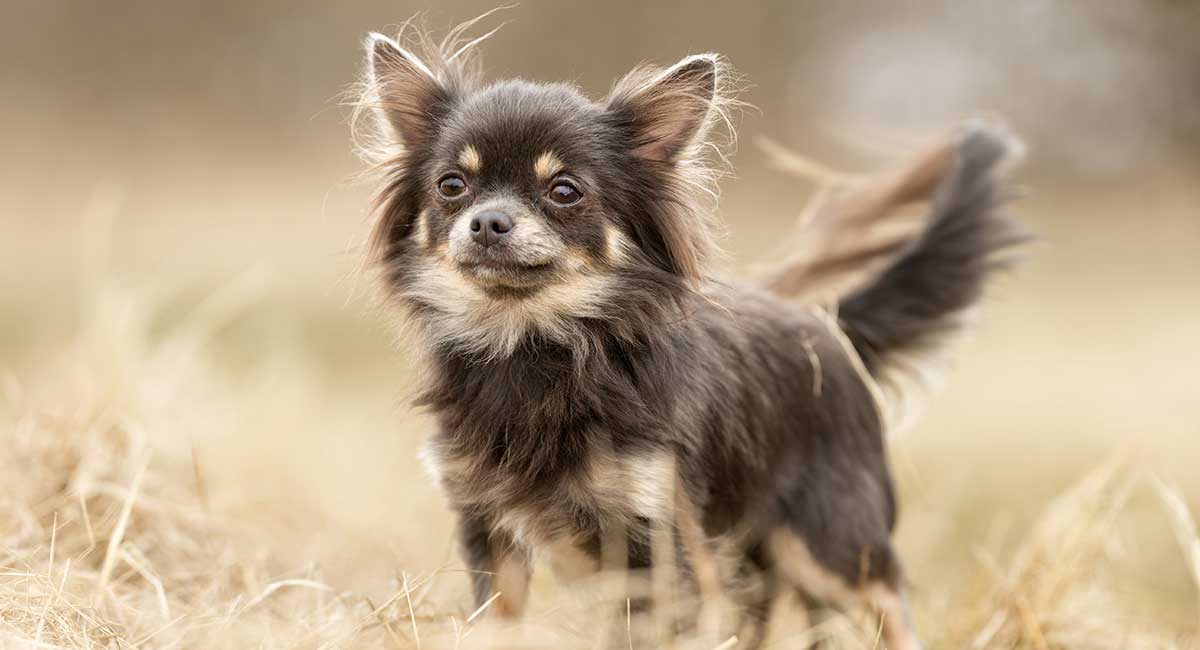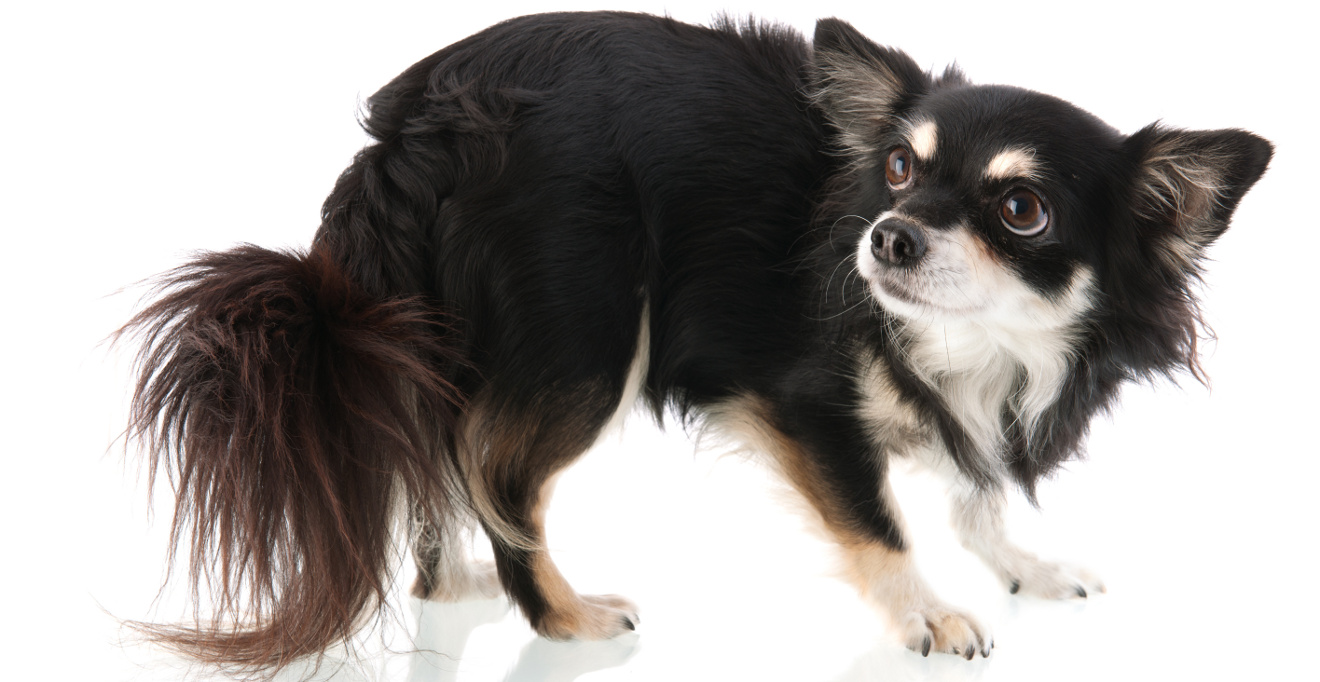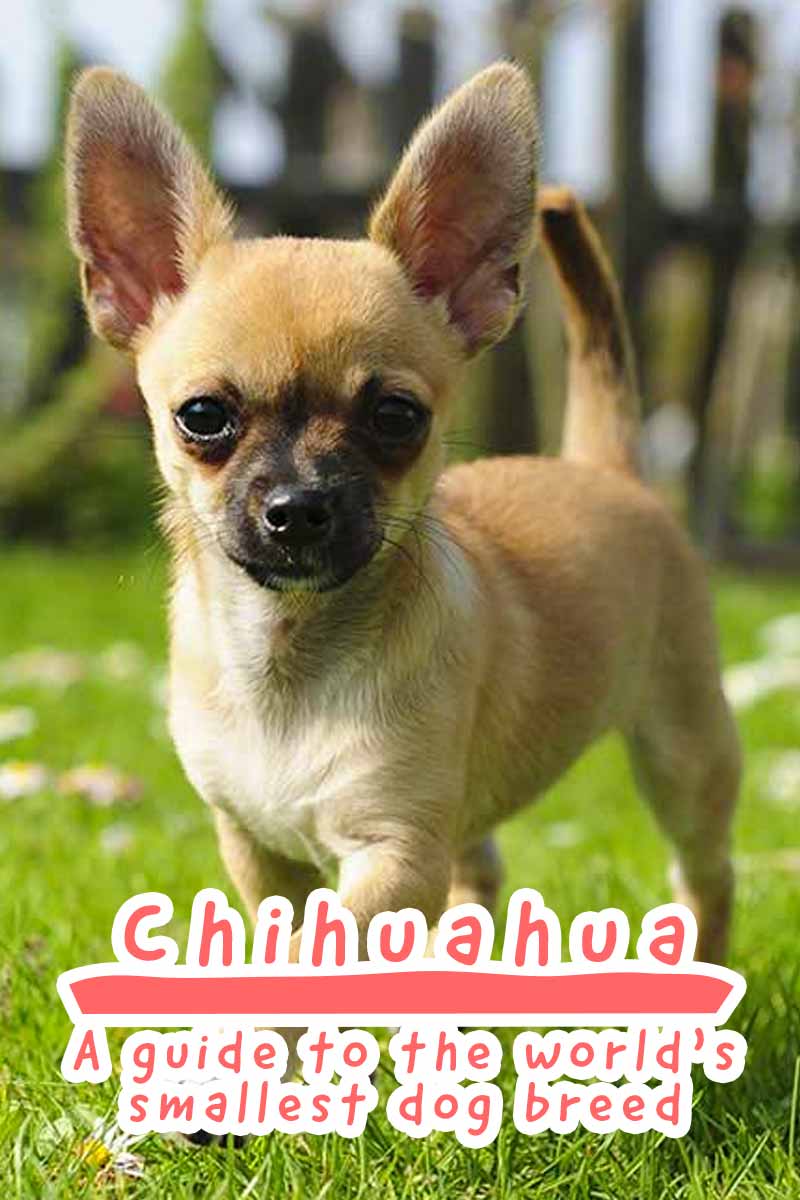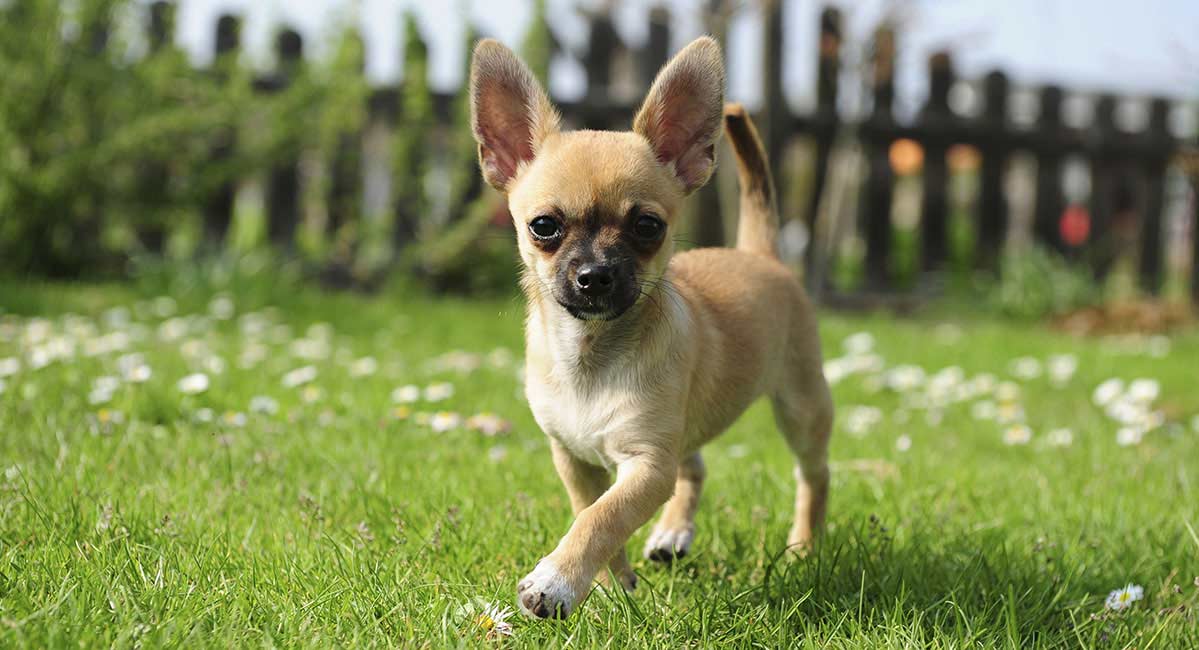The Chihuahua dog is the smallest of all canines, with a typical weight range of three to six pounds. There is a large variety in size, shape, color, and even coat type.
Perhaps because of that range, and because of their loyal attachment to their owners, the Chihuahua is a very popular pet.
But is this lapdog right for you? Let’s take a closer look at the type of family it will suit.
What’s In This Guide
- Chihuahuas At A Glance
- In-depth Review
- Chihuahua Training And Care
- Pros And Cons Of Getting A Chihuahua
Chihuahua FAQs
Our readers’ most popular and frequently asked questions about this tiny pup.
- Are Chihuahuas good family dogs?
- What were Chihuahua dogs originally bred for?
- How smart is a Chihuahua dog?
At A Glance
- Popularity: 32 out of 190 ranked by the AKC
- Purpose: companion
- Weight: typically between 3-6 pounds
- Temperament: loving but feisty
Chihuahua Review: Contents
- History and original purpose
- Fun facts about Chihuahuas
- Chihuahua appearance
- Chihuahua temperament
- Training and exercising
- Chihuahua health and care
- Do Chihuahuas make good family pets?
- Rescuing a Chihuahua
- Finding a Chihuahua puppy
- Raising a Chihuahua puppy
- Popular Chihuahua mixes
- Products and accessories
History And Original Purpose
There is some debate about the origins of this dog.
Most people assume they come from Mexico. This is a logical assumption, since they were named after the state of Chihuahua, Mexico.
However, they didn’t get this name until the 1800s. And it is still quite possible they came from another country.
Some of their ancestors may also have been native pet dogs. The Techichi dogs of the Toltec civilization are very similar.
This would mean this dog has been in Mexico for a very long time. Possibly even thousands of years!
Some people believe they can trace the Chihuahua’s ancestors back to the 1500s.
Whatever their origins, these tiny dogs have been lovingly bred as pets for generations.
Fun Facts About Chihuahuas
What do Britney Spears, Demi Moore, Paris Hilton, and Madonna all have in common? They have all been pictured with their Chihuahuas.
You can bet that photos of them with celebs have helped to increase the popularity of these little cuties!
And they have also been featured in a number of films, sometimes even as the main character. Beverly Hills Chihuahua is a classic example.
Despite his tiny size, the Chihuahua is as much a dog as any other. These little dogs enjoy doggy activities, and have a long history of being friends with humans.
Although small in size, they have quite a loud bark and are great watch dogs. In this way, they are like many terriers.
And it’s something to consider if your neighbors are not keen on noise!
Chihuahua Appearance
The Chihuahua is a very small and dainty dog. He has a balanced body shape and long arched neck. His eyes are large and round, and typically set fairly close together.
Large, upright ears complete the look. They also add to the dog’s ‘cute as a button’ appeal!
Chihuahuas can come in many colors, combinations, and variations.
Many standards do not specify the ideal height of a Chihuahua, but its height can range between 6 to 12 or even to 15 inches.
Both the USA and UK Chihuahua clubs put a top weight limit of 6 pounds on them. But there is often a difference between a dog bred for show and one which is a companion animal.
Many pet Chihuahuas weigh more, possibly even up to ten pounds. And that is not a bad thing, as long as the dogs in question are not fat.
Types Of Chihuahua
Standards call for an apple-shaped head, with a fairly short muzzle and eyes that are round but which do not protrude from the head. This type is referred to as “apple head.”
There are some Chihuahuas with flatter, less domed heads. These are known as deer head Chihuahuas. Some people prefer the dogs with flatter heads.
These two types are not separate, merely variations within the type.
The same is true of what are popularly called teacup Chihuahuas. These are very small variants. This can happen when the dogs are bred down purposefully, such as mating runts with runts. Or it may happen as the result of introducing a dwarfism gene.
But there, sadly, a lot of health issues when it comes to very small Chihuahuas.
We do not recommend purchasing a “teacup” variation of any dog, and especially not one that already tends to be very small and fragile. People who specialize in teacup Chihuahuas do not generally have the overall health of the dog at heart.
For more information on this, please read our in-depth article on teacup Chihuahuas.
Long Haired Chihuahuas Vs. Short Haired Chihuahuas
The story is a little bit different when it comes to coat length variations, however. This type is split into two coat types, short-haired and long-haired.
It is thought that the short-haired variety came first. The coat of a short-haired version will be smooth, soft to the touch, close and glossy.
The long-haired Chihuahua is the same size and shape. They simply have longer fur. This should be soft and flat or slightly wavy.
Long haired varieties have more fur on their ears, legs and tail too.
Other than that, there is really no difference between them!
Despite this fact, some kennel clubs register these dogs as two distinctive types, and don’t allow crosses between long and short haired Chihuahuas to be shown.
Chihuahua Temperament
You may have heard that they can be grumpy, or even prone to snap. There is some truth in that. However, there are many friendly Chis, too.
Chihuahuas have a terrier-like temperament. They can be a little feisty, to put it mildly. These little dogs definitely have big personalities!
With their long history as companion dogs, though, many are loving and devoted to their owners.
This devotion can, however, lead to guarding. This in turn can lead to growling, and even snapping.
They also seem more capable than some other dogs of turning on their owners. A 2008 study found that they were one of the most aggression prone pups.
This included attacks on both strangers and their own families. They are also prone to injury due to their tiny size.
Sadly, for all these reasons, they are not recommended for homes with kids.
Training And Exercising Your Chihuahua
Some Chihuahuas are easier to train than others. They are very smart dogs. Some work at advanced levels in competitions or on TV.
However, your devoted pup may show his loyalty with unwanted guarding, or be difficult to potty train. He also will need thorough socializing as a puppy.
It’s important to get good Chihuahua-specific training advice from the beginning.
Due to their small size, they don’t need a huge amount of exercise. This doesn’t mean that they can go without a daily walk or having some yard time. Little dogs still need to run and play outdoors. Regular but light exercise will also help keep this dog in top condition.
Potty training very tiny dogs can be a little more tricky. You will need to be patient.
Very tiny dogs have very tiny bladders. They therefore need to empty them more often.
Be patient and persistent. Follow good potty training rules, and you’ll succeed. Crate training may also be useful.
Chihuahua Health And Care
Chihuahuas are definitely prone to certain health issues. Most are due to their size. This article goes into more depth.
Being on the small side is a health advantage when it comes to dogs. But being very tiny indeed is not.
Hence, tiny dogs share a range of sometimes serious health problems.
They are prone to stress injuries like patellar dislocation. This is where the kneecap pops out of place. The Canine Health Information Center recommends that they are health tested for patellar issues, as well as cardiac and eye troubles.
Other Issues
Other health problems include epilepsy and low blood sugar. There is also a risk of tracheal collapse.
It’s usually possible to avoid very low blood sugar by feeding your Chihuahua little and often.
In other words, more small meals rather than one or two larger meals each day.
Chihuahua Dental Problems
Extra dental care is needed for tiny dogs. Their teeth get crowded together in their little mouths.
This crowding makes decay more likely.
This dog needs all the help it can get against dental disease. Daily tooth brushing is a must. However, it can’t ensure good dental health.
Diet can be an ally in fighting tooth decay. Steer clear of sweet treats. Food high in sugar content could make dental issues more likely.
Your Chihuahua will need regular dental checks. Keep an eye on his mouth yourself too.
This way you can spot early on if it looks bad. Dental work can then be carried out early.
Birthing Problems
They also suffer from difficulty giving birth. They often need assistance.
Why this happens exactly isn’t incredibly clear.
But it is likely to be due to the extreme physical features of the dog. Namely, the bulging head shape. Selecting for this head shape, sadly, isn’t helpful when it comes to health.
This is vital to keep in mind if you intend to have puppies.
Your female Chihuahua will need extra care during birth. This is likely to mean additional costs.
Brain Problems
There is also the danger of necrotizing meningoencephalitis.
In this illness, brain tissue swells and dies off. This results in random and strange movements.
It can also bring about severe pain.
Chihuahuas have this risk in common with some other toys. It’s likely also a result of their small heads.
Don’t forget, if you have any worries about your dog’s health, your vet is the person to contact.
Accidental Poisoning
Chihuahuas can easily be poisoned by quite small amounts of chocolate. Or, indeed, any other substances that are toxic to dogs. This is due to their size.
Be very careful to avoid letting your dog eat chewing gum. It often contains xylitol, which is a poison to all dogs.
Fragility
The Chihuahua is not just small. He is also fragile and prone to broken bones.
These dogs are at risk of injury from being knocked or dropped by their human family. Falls and other accidents in the home can be serious.
Tiny dogs are also at risk from other dogs. Whether in attack or in play, a larger dog could pick a Chihuahua up and shake him. Such trauma could result in serious injury or even death.
Sadly, fatal attacks can and do happen. So you will need to take steps to ensure your dog’s safety outdoors.
Be careful when out walking. Mind who you allow your dog to approach or play with.
You can’t be as off-hand as you might be with larger dogs. This is especially true with puppies, as they’ll be even tinier!
Chihuahua Lifespan And Grooming
So how long do Chihuahuas live? Even with all the above issues, we’ve seen many claims for long life in Chihuahuas.
But a study published in 2010 looked at 407 Chihuahuas, including 71 death reports. The study found that they have an average lifespan of about 12.4 years.
Despite this, their lifespan is by no means the worst dog when it comes to a long life.
Short haired Chihuahuas are very low maintenance. They don’t need much grooming.
Still, it’s good to get any dog used to having a brush run through its coat.
If you are busy, the short haired dog will be fine if you skip a few days. Their long-haired cousins will require more frequent brushing. Their fur may also need a light trim to keep them in good order.
Do Chihuahuas Make Good Family Pets?
It’s true that as popular as Chihuahuas are, they’re frequently found as a family pet, and often along with other dogs as well. However, we cannot recommend that you choose this type if you have small children or larger dogs.
Chihuahuas are fragile and easily injured if dropped by children.
Children under the age of seven also can’t control how tightly they grip your little dog. They can hurt them.
And larger dogs could easily hurt the Chihuahua, even without meaning to.
For this reason, and because of the possible aggression and guarding problems mentioned above, they are not recommended as a pet for a family with small children.
For a family without children which is willing to put time and love into training their only-dog, this dog could be a good option to consider.
Rescuing A Chihuahua
If you are thinking of getting a Chihuahua, do consider rescuing an older dog that needs a home.
Consider adopting from an animal shelter. There are many small dogs waiting for a loving home.
Adopting a dog will save the often considerable fees you would pay for a puppy. And it gives a needful dog another chance in life.
TIP: Bringing home a rescue dog? A great way avoid “accidents” is to treat them like a puppy.
They won’t instinctively know where you want them to pee. Let them out often. And keep them on a washable floor until they have settled in.
For Chihuahua rescues, take a look at our list below.
Finding A Chihuahua Puppy
On the other hand, you may want the chance to pick your baby Chihuahua and watch them grow. In this case, you will likely have a lot of options as these are popular dogs. But there are some cautions in order.
Make sure you pick a litter with an owner who is open about health testing and parents’ background. The parents of your puppy will help to give you a good idea of the puppy’s future nature. It is a good idea to ask to meet both parents. Make sure they are each friendly when you see them.
Please be sure to avoid puppy mills, pet stores, and backyard people. The first two will not have the best interest of the puppy at heart, and will be focused on making money, often at the expense of the stock’s health. The second often will not have health tested their dogs.
Put Your Dog’s Health First
Don’t be sucked into buying a puppy from very tiny parents. Slightly larger dogs may even be healthier. More space in the skull and mouth will help ensure a better quality of life.
So it’s a good idea to avoid anyone that is selling ‘teacup’ puppies. A bigger baby Chihuahua will have a better chance of a long and healthy life.
For helpful information on finding puppies, take a look at our puppy search guide.
One thing to keep in mind is the likelihood of finding a mixed dog that has one Chihuahua parent. This is actually often a benefit to the dog’s health. And hybrids are increasingly popular.
Raising A Chihuahua Puppy
Remember, temperament is only partly inherited. The way puppies are raised is important too.
Being very thorough with socialization is the key to a friendly dog. This will help to avoid the puppy growing into a snappy or grumpy adult.
Caring for a vulnerable puppy is a big responsibility. There are some great guides to help you with all aspects of puppy care and training. You’ll find them listed on our Chihuahua puppy page.
Popular Chihuahua Mixes
Are you interested in a mixed Chihuahua?
There are lots of varieties available:
- Chihuahua Poodle mix
- Jack Chi mix
- Pomchi mix
- Chihuahua Terrier mix
- Chorkie
- Chihuahua Dachshund mix
- Pitbull Chihuahua mix
- Chug mix
Comparing The Chihuahua With Other Dogs
It can be hard to truly compare one dog with another, but sometimes it’s necessary in order to know which type will suit you best.
Let’s compare theChihuahua with the Shih Tzu. Both small dogs, with spunky personalities, they yet have more differences than they do similarities. Which is right for you?
Similar Dogs
If you’re thinking of getting a Chi, but not entirely set for some reason, you might also like to consider these other small pups.
- Yorkshire Terrier
- Jack Russell Terrier
- Whippet
Pros And Cons Of Getting A Chihuahua
Cons
- Not well suited for homes with kids
- Better as only dogs or with other small dogs
- Many health issues
- Potential for aggression and guarding
- Very fragile
Pros
- Intelligent
- Loyal and loving
- Perfect for small houses or apartment living
- A good possible choice for single people or for couples, as well as families with older children
Chihuahua Products And Accessories
- Beds And Baskets
- Food For Adults
- Chihuahua Clothing
- Food For Puppies
- Harnesses
Chihuahua Rescues
As popular as Chihuahuas and their mixes are, there always seem to be some in need of a home.
Rescue organisations include:
- Chihuahua Rescue and Transport (USA)
- Rescue UK
- Chihuahua Rescue Australia and
- Canadian Chihuahua Rescue and Transport
Do you know about a rescue that’s not on our list? Comment below and let us know.






Richard Daniels says
I have a 6 year old black and tan male on the high end on size. He thinks that he is a Rottweiler.
Raymond Weele says
Well am not completely agree about chihuahua , and the vet i had for my chihuahua , longhair , she was very healthy ,and get on a ten days almost 14 years old , had never complaints only she had times she wouldn’t eat ,or her food ,she didn’t like anymore ,and wanted something new foods , she liked a bit cooked ,egg, and she refused choclat ,real good because ,choclat isn’t food for a dog ,and is only for humans , but as I eat choc lat she barket ,and wanted not I eat choclat , she had a bar In a box she took it form my table and hide the choclat in a cabinet with cloth , a layed on the floor in a corner ,and pushed with het nose shoes from me on it , my Dog Sana White lady , was very friendly and never barked to much , lived for playing ,and drivin on my bike ans had her special dog basket nice soft and she lay on a sheepfur in the basket , and one time i was to the vet because she eat a smal dogg chewing meat ,and get almost choke in it ,a get ride away to the doctor so Vet , and he said ,well ,it remarkable chihuahua’s are almost not sick
and very healthy and get very old , he had a chihuahua ,who get 23 years old ,
and well this is what i said a good bloodline chhuahua ,and good treat from the owner , keeps your chih .very healthy and you have a lot fun together , my dog Sana is died in 2015 , and will never forget my little friend with great dog character , well she was very special for me . ~~
i
Olivia walker says
I have a chihuahua toy mix and she scratches her eye until it’s swollen and really red it happens a couple times a month Dose anyone know why——- is perfer if y’all would email me
Toby Barden says
I lost my Loki on April 1st. We had 13 wonderful years together. He was at my side 24/7. He was a pound rescue. There was a sign on his cage that said Special today $37.50. I asked the atttendent why he was so cheap. He told me this tiiny dog had been there 3 months and they couldn’t keep any longer and after the weekend he was going last ride. He was plan but cute. He guarded me , soothed me, And loved me and oh how I love and miss him.A month later my son gave me a puppy. He said I looked lost and I was without Loki at my side. The pup is a chi-papi mix. The cutest guy ever… But what a handful! I love him with all my heart. Hard to find chi”s. My son drove a 120 miles to get my guy, Strider.
Sandy Barnett says
I have a long hair Chihuahua named Kassy Girl. The best little girl ever. She weights 4.5 lbs. She is my service dog. Seizure alert. She goes to my left shoulder before a seizure to warn ne. I know to sit down . She is 8 years old. Faun sabel in color.. I wanted to share Chihuahuas are very smart. She loves everyone. Pet friendly. I am so blessed.
Leola Sotir says
I live in Gainesville FL looking for a chihuahua puppy, do you know a breeder or someone who rehomes any in my area
Vee Lynn Reed says
I just lost my cuddle bug a week ago, I rescued him in 2008 he was two at that time, he was my baby boy, I miss his love, he needed me as much as I needed him, I am so broken, I want to find another Deer head Chihuahua, I don’t care about papers I just want to know he was raised in a loving home I would prefer puppy or young and a male
Rebekah says
I so agree with you!
My heart is broken I’ve lost my little girl, aimee starr.
She was going to be 19 in Dec. 🙁
I MISS her so!
I’m looking but can’t find one. 🙁
Susan Leva says
I had three Chiuahua Sophia long hair,I had to put to sleep because of cancer she was 16 1/2 ,her puppy Timmy just passed away at Christmas in his sleep next to me,he was 14 yrs old my third boy was the daddy to Timmy and he is 15 1/2 he is deaf,and is declining in his health I think he is grieving he has never been alone I am thinking of getting a older Chiuahua to keep him company good idea or not all he does is sleep 22 out of 24 hrs day no play, eats inconsistently. Any advice
Cheryl says
It sounds like you love this breed and your absolutely right they grieve when a sibling passes. I had 11 and have lost some due to various illnesses most of them were rescues and every time I brought one home it was instant acceptance. I would tell them you now live in the lottery home.
Sherrie Brackney says
and I love them to death. Goes I’m an animal lover anyway I have three dogs I have one that is 11 years old when it’s 10 years old I have one it’s only seven months old she’s a chi she only weighs two and a half pound.. I had a little boy would be 19 in April he died right before Christmas and breathing problems oh my OMG it tore me up. Also had a little girl that was I inherited from my ex-husband he passed away and I took her course I had her around me for 11 years and a bigger dog attacked her no matter what my daughter and I did we cannot get her away from that dog and she died from her injuries try to get her to the vet. That was so horrible too. I really love my babies My little rat Terrier Missy Jean is a sweetheart. Mouthy little sweetheart Bitty Jo is 10 years old she rat terrier Shar Pei Shepherd Lab and chi also.. she is a sweetheart really laid-back like a lab. She is not a big dog only weighs 8 to 10 lb. My little G my newest when it’s 7 months old “Elsie” after the cow. She is marked like a cow. She is also a ! She has her feisty moments. I would take nothing for any if them. Her mother recently had another litter and one only weighed 1 half if a pound. She lived for 5 days. My sister did everything she did to,keep her alive. She was strong fir the first 4 days. She was nit as long as a pet bottle. The vet said it could be touch and go. It is very hard to raise a premed.
Mary Conway says
My “Izzy Bell” is a Chorkie a little over a year old. She is devoted, loving, loyal, energetic, playful, and about the cutest little thing I’ve ever laid eyes on. She is definitely her Mommy’s baby too, strictly my baby girl, always at my side or in my arms. She has the most expressive little face, and I can most of the time tell exactly what she wants just by the expression on her face when she looks at me without her having to make a sound. She loves to play ball, that is her favorite game, tug-f-war being second in line. I could go on four hours about her. She is my baby and I would protect her with my life, just as I would any of my “birth” children.
Susan says
I just lost my Dominique right before x mas and my husband had to have 3 stents put into his heart 2 days before x mas.She was my baby for 14 years. She was white and weighed 3lbs. I would love another one so much..Susan
penny says
we lost our daisy on dec. 16th. she was having breathing problems and in pain. the vets did not know what was wrong. i miss her despretely. she was a great companion. i want another one but mom said no!
jenny adams says
hi my name is jenny i have a beautiful little family of Chihuahuas mum dad daughter and son they are all under 2.6 kl-gs except for my little boy and they are the most loving little babies they all sleep with me and love to be sitting on the lounge when I,m there ,My little boys back legs are starting to look very bowed and it worries me he still gets around OK and they all eat the same amount of food every night which is chicken rice and veg that cook for them but he seems to be getting bigger what can i do for him regards jenny
Kathryn Hall says
Have his thyroid checked.
Tarnya irby says
I just rescued a teacup chihuahua and am having issues altready. She is scared and doesn’t seem to trust me. She is having potty accidents often. I got her two days ago and am trying to assure her that she’s safe and loved.
Pippa Mattinson says
Good luck with your rescued dog Tarnya, it takes time to build trust but making her feel safe is the key and with patience she should come around. 🙂
Ralph says
I have a Chihuahua. Cooper is my baby boy. I love him so much he is so sweet. He loves my wife and I and is very protective.
MELINDA TRUITT says
I have a chihuahua rat terrier mix puppy she is 14 weeks old now . I am wondering about her eyes seem to water a lot is that normal.
Tenielle says
See
Tenielle says
I do have a small chihuahua so yea skye
Tenielle says
Ok
Tenielle says
I have a chihuahua